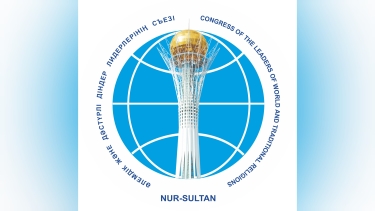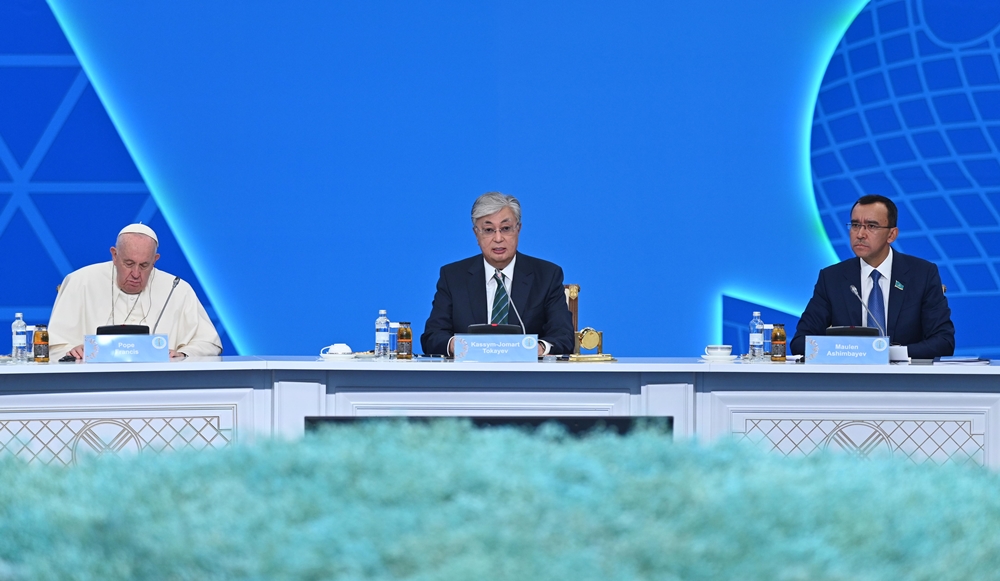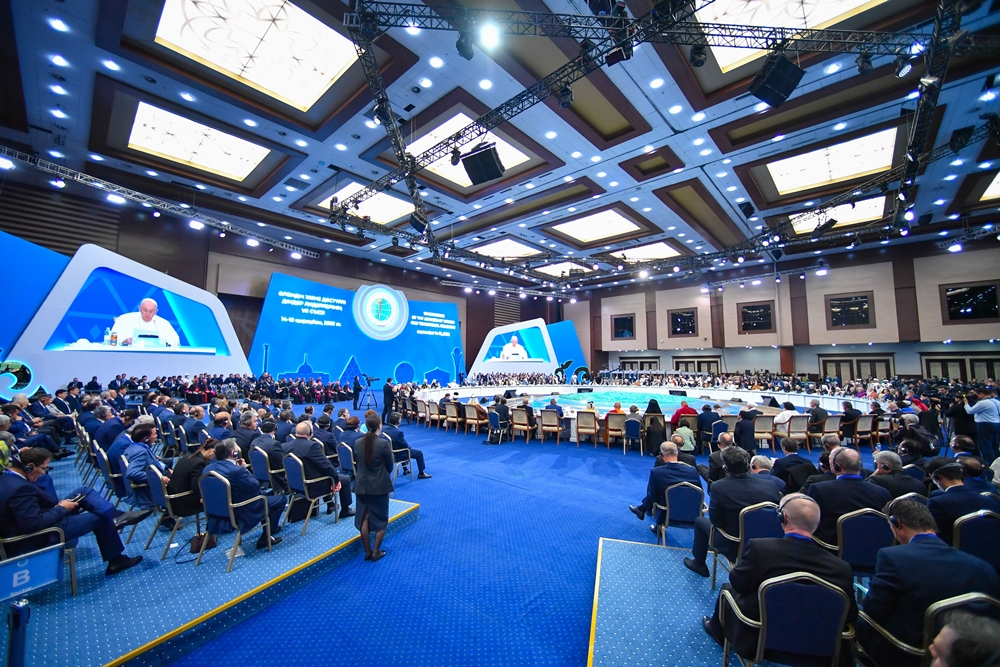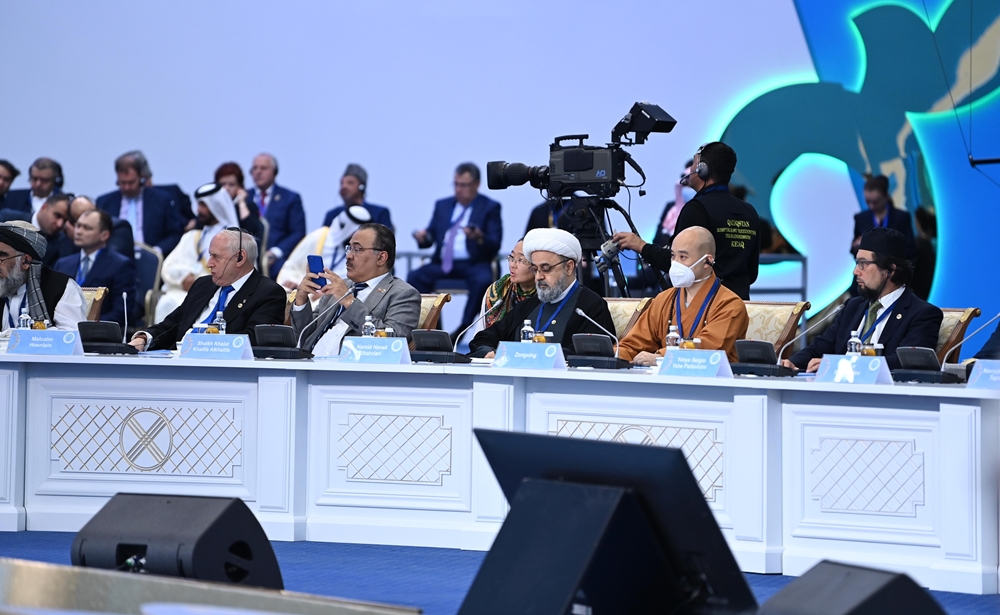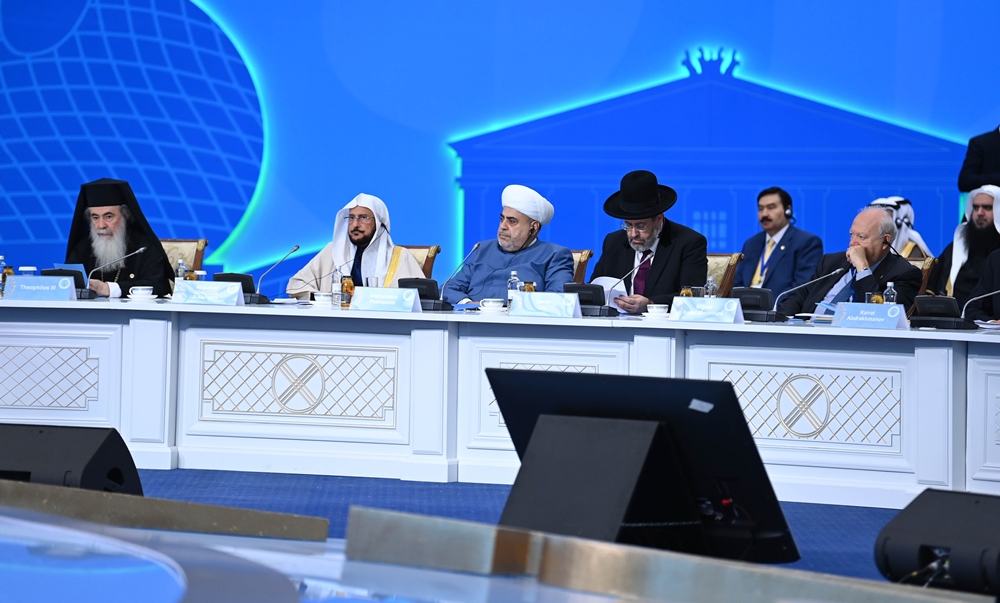The VII Congress of Leaders of World and Traditional Religions started Wednesday, 14 September 2022 in Nursultan, capital of Kazakhstan.
The plenary session of the forum titled “The role of leaders of world and traditional religions in the spiritual and social development of mankind in the post-pandemic period” was opened by President Kassym-Jomart Tokayev.
“Our Congress has become one of the key global formats of inter-civilizational dialogue. It is symbolic that the initiative to hold this interreligious forum came from Kazakhstan. Our ancient land has been a connecting bridge between East and West for thousands of years. Here, in the Great Steppe, the heart of huge nomadic empires was beating, part of the cultural code of which was always religious tolerance,” said Kassym-Jomart Tokayev.
The leader of Kazakhstan pointed to the fact that the territory of this country is like a map on which the shrines of all world religions are marked. Kazakhstan absorbed the traditions of different civilizations and religions, the spirit of tolerance and openness. Currently, representatives of more than 100 ethnic groups live in harmony in Kazakhstan, about 4,000 religious associations representing 18 confessions operate freely. The principle of “unity in diversity” is fundamental for Kazakhstan.
Speaking about the importance of the Congress of World Religious Leaders in Kazakhstan’s foreign policy, Tokayev stressed that “In today’s complex realities it is extremely important that religious leaders, sitting around one table, demonstrate to the world an example of goodwill that overcomes all differences. In my opinion, this is the main mission and peculiarity of our Congress.”
The head of Kazakhstan listed the challenges that humanity has faced at the present stage of historical development – the spread of the coronavirus, which has greatly affected all spheres of life – economy, politics, social relations, the atmosphere of hostility and mutual distrust that has returned to international relations.
According to the Kazakh leader, “it is impossible to resolve contradictions by force, threats or sanctions. At such moments, it is especially important to remember humanistic ideals. Their main guardians, of course, are traditional religions.”
Tokayev believes that the new security system should be based on such pillars as the absolute value of human life, respect for each other’s interests, mutual assistance, openness, equality and justice. Moral authority and the word of spiritual leaders are very important in this matter.
In this context, the President of Kazakhstan proposed several topics for discussion. Among them is the need for large-scale reforms in all spheres of life to revive the true spirit and meaning of civilization.
Everyone needs a new global movement for peace to build a new system of international security. And according to Tokayev, the role of spiritual leaders in this matter is paramount.
As the head of Kazakhstan stressed, “we observe how societies are being fragmented and polarized under the influence of digital technology. For many, the virtual world already replaces the real one. Therefore, in the new digital reality it is necessary to raise the question of cultivating spiritual values and moral guidelines in a new way. The cult of knowledge and education without the right system of education of the younger generations will not lead humanity to universal progress and prosperity. Religion has always fulfilled this basic function of education. The Quran, the Bible, the Torah, and other scriptures are imbued with ideas of humanism, compassion, and mercy.”
The UN Secretary General and the head of the World Islamic League sent video addresses to the Congress.
Antonio Guterres called on religious leaders to reject xenophobia, racism, and all norms of violation of tolerance. “We can withstand the challenges of our time and build a better world for everyone by uniting as one human family, sharing burdens, solving problems and taking advantage of opportunities,” he said.
Guterres also expressed hope that “the leaders of the faith will use their voice of conscience and spiritual authority to promote mutual respect, compassion and unity, in order to settle differences peacefully, to recognize diversity as wealth, in order to be in solidarity with each other and with future generations.”
The Secretary General of the World Islamic League, Mohammed bin Abdul Karim Al-Issa, noted: “We all know that most of the conflicts and wars in the history of mankind have arisen as a result of ideas attributed to religions. These religions really expressed only the aspirations of their authors. We are all aware that throughout human history and even today, mistakes in thinking and making decisions have led to unfavorable and occasionally dangerous outcomes. The main reason for all this is the distance from the other, this distance carries mutual fear and anxiety and leads to the abyss.”
Abdelatif bin Abdulaziz Abdrahman Al-Sheikh, Minister of Islamic Affairs, Exhortation and Guidance of Saudi Arabia, spoke about the role of religious leaders in difficult times. “The importance and influence of religious leaders on people’s lives is increasing all over the world during crises, disasters and troubles. Because those who are confused start looking for something that strengthens them, and those who are afraid and anxious are looking for those who remind them of the solidarity of the Almighty,” he stressed.
Pope Francis urged people to break away from limiting and destructive ideologies, from cruelty, extremism, fundamentalism, fanaticism, terrorism. “The time has come to make our hearts clear, to put aside the history books and leave the conversations that have long generated distrust of religion. Religion is not a problem, but something that contributes to a harmonious life in society. We need religion to quench our thirst for peace,” he underlined.
Speaking at the plenary session, the Supreme Imam of Al-Azhar, Sheikh Ahmed al-Tayeb, emphasized the importance of consolidation: “Religious brotherhood is a prerequisite for global international brotherhood. I am not calling for the merging of all religions into one – we are convinced that this idea is destructive and roots out religion. I call for serious work to strengthen the values of all religions.”
The representative of Orthodoxy, Metropolitan Anthony of Volokolamsk, Chairman of the Department for External Church Relations of the Moscow Patriarchate, stressed that religion exists beyond political borders: “The dialogue of religions, the broad development of religious education, the unity of believers based on moral foundations is the best answer to the challenges of our time.”
The Sephardi Chief Rabbi of Israel Yitzhak Yosef in his speech drew attention to the importance of the ability to concede and negotiate. “Making concessions to one’s neighbor and giving up bad habits guarantee us the same behavior in return. Religious leaders should be an example of patience, compliance, respect for each other, being a practical example of kindness,” the rabbi said.
***
The VII Congress of Leaders of World and Traditional Religions differs from previous forums by the unprecedented level of its attendees, proving the value of Kazakhstan’s platform for discussing how spiritual leaders and religions can aid humanity in finding harmony, relearning tolerance, and embarking on the path of creation.
At the end of the Congress, the Final Declaration will be adopted – the key document on the results of the VII Congress. The Declaration’s text will reflect the leaders of the major world faiths’ aims and their appeal to the international community, as well as their understanding of the problems of our day and potential solutions. It is expected that the Declaration will be distributed as an official document of the 77th session of the UN General Assembly. ///nCa, 14 September 2022
